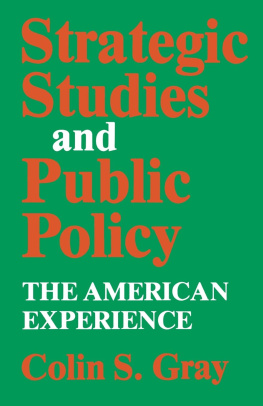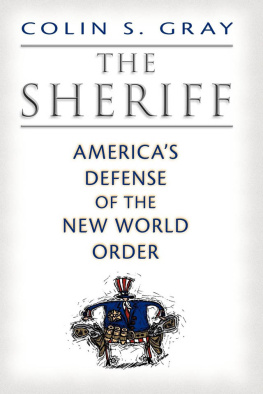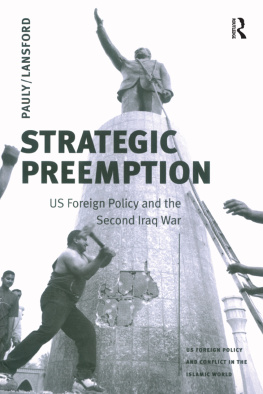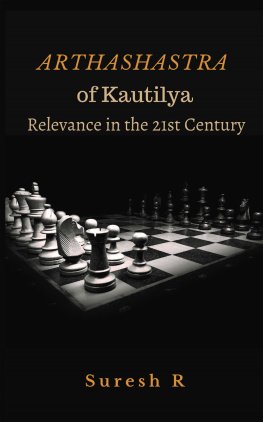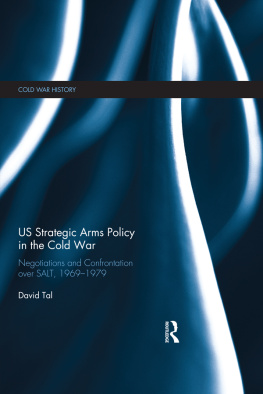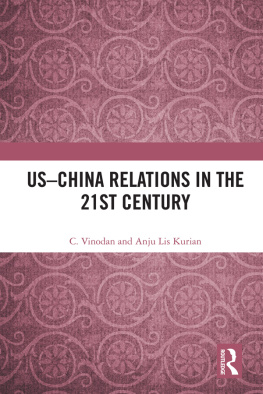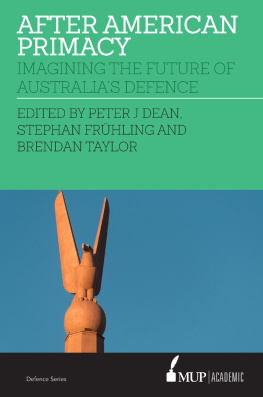Copyright 1982 by The University Press of Kentucky
Editorial and Sales Offices: Lexington, Kentucky 40506-0024
Library of Congress Cataloging in Publication Data
Gray, Colin S.
Strategic studies and public policy.
Includes bibliographical references and index.
1. United StatesMilitary policy. 2. Strategy. 3. United StatesForeign relations1945 I. Title.
UA23.G783 355.033573 80-5175
ISBN 978-0-8131-5272-1 AACR2
1
Catalysts of Inquiry
The problems of the 1980s speak eloquently to the relevance of strategic studies. Fundamental questions of strategic theory and strategic policy remain to be resolved by Western defense communities. Strategic problems comprise a moving target and require a constant renewal of intellectual attention. The content and character of the field are specific as to time and place, but the need for the study of strategy is implicit in the very nature of international life.
This book endeavors to tell the story of the American experience with strategic studies since 1945. Although I have strong opinions on particular contemporary policy questions, such advocacy as there may be in this book is strictly secondary to the books major purposesto record and interpret the evolution of the field of strategic studies in its relation to public policy, and to provide some understanding of the degree to which strategists may legitimately be held accountable for the actions and inactions of states.
The strategic studies profession in the United States is an integral part of general intellectual history. The genesis and evolution of a civilian strategic studies profession was a particularly, indeed virtually uniquely, American response to the demands of nuclear-age international politics. After 1945, for the first time in its history, the United States was obliged to think long and hard in peacetime about strategythat is to say, about the relationship between military power and political purpose. The United States is the only country that has come to enjoy the benefits, for good or ill, of a sizable extra-official community of strategic theorists and genuinely expert defense policy commentators. The explanation is not difficult to find. Only in the United States, with its firm tradition of open government, have officials been willing to share their secrets with outsiders. Furthermore, only in the United States is it possible for individuals, with relative ease, to have mixed careers involving occasional periods of official service, university teaching (or affiliation, at least), think tank research, private consulting, and possibly employment in defense industry. This freedom of individual career movement, with expertise quite well dispersed, has made for a richness of community embracing a diverse set of complementary institutions which does not exist elsewhere.
In attempting to assess the achievements of strategic studies, explicit attention must be given to the problem of values. One mans exciting and creative study is another mans manual for mass slaughter, or at least for living dangerously. There is an inescapable tension between the perspective of the scholar and the perspective of the policymaker. In exaggerated phrasing, one may discuss the enduring presence of two ideal types, which helpfully identify the dualism that permeates much of strategic studies. The scholar asks of his product, Is it true? and Is it interesting? The policymaker asks, Is it useful? Despite this in-built tension in scholar/policymaker relations, a prime thesis of this book is that many of the grounds of mutual complaint are in fact formed upon misunderstanding.
To adopt William T.R. Foxs distinctions, strategic studies should be thought of as being policy-relevant rather than policy-oriented. The former is knowledge that should prove useful to a policymaker in the diagnostic and search phases of his grappling with a policy problem, and should contribute to better comprehension of the nature of that policy problem. Policy-oriented study implies a framework of scholarly reference closely geared to the principal constraints as felt by responsible policymakers. The danger of the prostitution of strategic scholarship, reardless of motive, is a serious one. Contrary to the implications of many critics of academic (employed pejoratively) strategic studies, the scholarly strategist is unlikely to produce creative work of value to the community if he is not true to himself as a scholar.
Commentators reared in a culture that expects and reveres progress, and that takes the evolutionary paradigm to be a law governing intellectual as well as biological phenomena, find it all too easy to compartmentalize their historical subject matter into periods. Instead of viewing strategic ideas as a near-constant stock, some of which are dusted off and repackaged for the debate of the moment, it is fairly common to discern innovation. The view is just sustainable that there are no new ideas in strategic studies. The determined antiquarian can trace almost all of the strategic concepts in contemporary use to the practice and thought of periods long past. Similarly, even within the nuclear age, one can argue that ideas have not developed in any very meaningful sense. The fact remains that to many of the postwar students of strategy their ideas were new. Similarly, although strategic debate seems to have registered a cyclical path in the past decade and a half, many of the contemporary students of strategy are unwilling to repeat the often very relevant thoughts of their strategic forebears. In short, knowledge may to all intents and purposes be lost; it may remain largely unread on library shelves.
A subsidiary purpose of this book, implicit in the above, is to suggest the continuity of strategic and international political thought and practice across the boundaries that conventionally demarcate historical periods. Without embracing the notion that the unchanging paradigm for international politics should be a totally Gothic model of a Hobbesian world order (or disorder), the understanding of the enduring features of statecraft to be gleaned from a Thucydides is no less impressive than is the collective product of many modern scientific investigations. This book explores the history of modern strategic studies and the character of the strategic studies professionan exploration designed to enable consideration of the record of scholarly achievement in expanding knowledge, and the record of contribution in terms of utility to public policy. From this exploration recommendations for the future course of professional activity are derived.
All strategic scholars approach each problem in the light of their general understanding of the nature of contemporary international politics, their very personal, often extrarational, predispositions, their own past public record on related problems, their understanding of the judgment of professional peers, and their assessment of the ambiguous evidence. All strategists acquire what may be termed a strategic ideology. Whatever the issue may be, no strategist simply appraises the facts. What is important is that strategists be as explicit as possible concerning their attitudes toward their subject matter.
A number of the less restrained critics of strategic studies confuse medicine with disease. If war, the threat of war, and arms competition constitute a disease endemic in the inter-state body politic, then strategic studies is essentially prophylactic. It is commonplace to assert that students of strategy attend only to the symptoms of potentially fatal disorders, and that the net effect of their endeavors is to contribute to maintaining an international (in)security system which has built into it the risk of war and the cost of arms races. This judgment touches upon fundamental questions pertaining to proper research objectives. Suffice it to say that one must beware of the scholarly fallacy: the notion that the truth will set us free. There is no reason, for example, to presume that even were scholars able to solve the problem of war and to explain (and hence predict) which combination of variables tended to produce warlike outcomes, wars would cease to occur.

